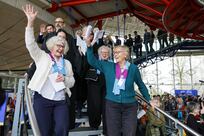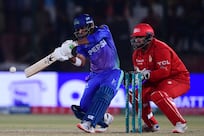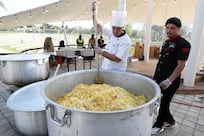LONDON // There is still everything to play for, as the politicians and pundits chirp incessantly, as the UK election campaign goes into its final, frenetic week. The paradox is that, while there really does seem everything to play for in this, the closest three-way contest in modern political history in Britain, the end result could be stalemate, even given prime minister Gordon Brown's propensity for scoring own goals.
Yesterday, in the wake of the final TV debate among the leaders of the three main parties on Thursday night, the consensus among the pollsters, media analysts and focus groups littering this campaign was that the result was still much too close to call. David Cameron, the Conservative leader, was deemed to have edged the debate, closely followed by his Liberal Democrat counterpart, Nick Clegg, with Mr Brown a game third.
Which, for the Labour Party leader, was a good result given that, only 24 hours earlier, he had been pilloried for calling a grandmother and lifelong Labour supporter "a bigoted woman" after encountering her on the streets of Lancashire. Mr Brown, of course, had not meant to have his remarks, made in the privacy of his official car, overheard. But he forgot that he was still wearing a radio microphone feeding various TV companies.
The ensuing uproar led to charges of Mr Brown being two-faced, uncaring and out of touch. The pensioner, Gillian Duffy, had raised the question of mass immigration from Eastern Europe with him - a subject Mr Brown, along with the other major parties, are uncomfortable discussing. But, by yesterday, the row appeared to have subsided, even in the Tory-dominated press, and attention returned to the unbelievably tight battle for votes.
Unlike any election in living memory - unless, that is, you are very old and can recall the three-way split after the December 6, 1923, poll - all three parties have an almost equal share of the public's affections. And that includes the Liberal Democrats, the perennial outsiders who have come a dismal, and often abysmal, third in virtually every election since the Second World War. Yet this time, the British public, apparently tired of parliamentarians' expenses fiddling and impressed by the performances of Mr Clegg in the three TV debates, are turning away from Labour and the Conservatives as never before.
Little more than a month ago, the Tories seemed a shoo-in with a double-digit lead over Labour. But an average of the opinion polls over the past week puts them at 33 per cent, the LibDems at 30 per cent and Labour at 27. "It's delightfully unpredictable," enthused Nick Robinson, the political editor of the BBC, though it is doubtful that Mr Brown, desperately trying to cling to the power that his party has held for the past 13 years, agrees.
He has put the economy at centre stage in his campaign, saying the only hope for recovery is by pursuing the policies that his government has overseen since the global recession began to take hold two years ago. For the Conservatives, Mr Cameron has been pushing the notion of small government, saying he would give power back to people, enabling them to set up their own schools, sack their police chiefs and hold referendums on contentious local issues.
Mr Clegg, meanwhile, has put electoral reform - in essence, a change to proportional representation - as a prime condition for his going into coalition with either of the other two in the event of a hung parliament. There are, though, very few big ideas knocking about, mainly because Britain is so far in debt that, after the election, there is not going to be much money to spend, whoever wins next Thursday.
"There's not an enormous amount of change in either [Labour or Conservative] manifesto, and certainly nothing that costs much," said Tony Travers, a political analyst at the London School of Economics. "None of them can afford to make major spending commitments." All of which leaves the parties with everything to play for, even if the many neutrals in the crowd seem quite happy at the prospects of a 0-0 draw come the final whistle.
dsapsted@thenational.ae





